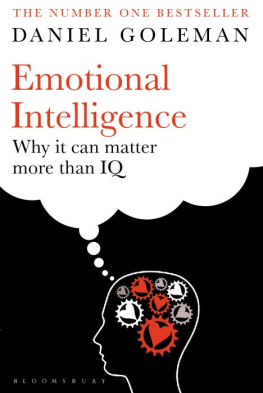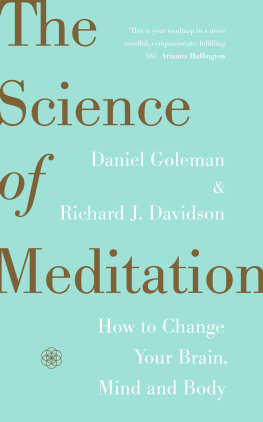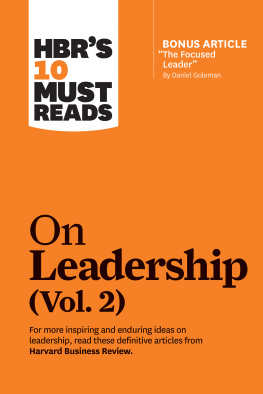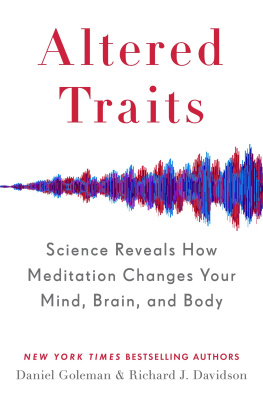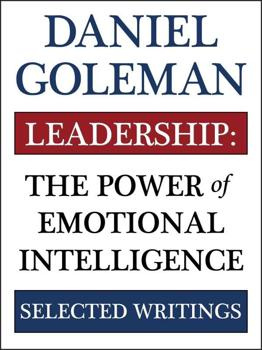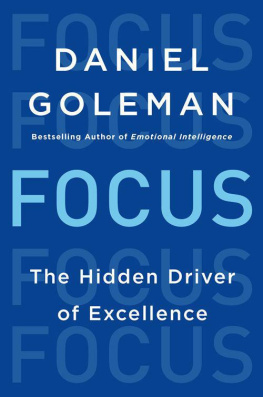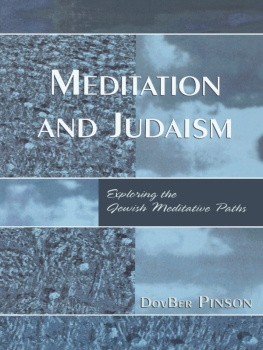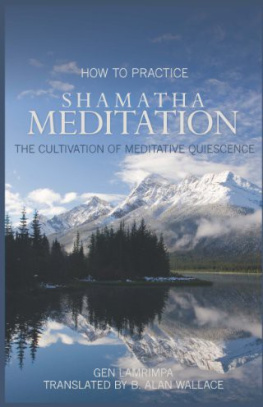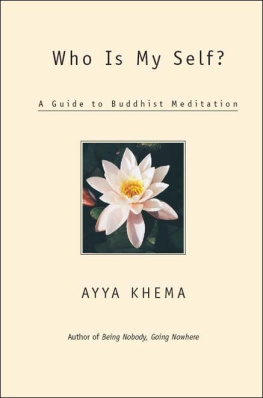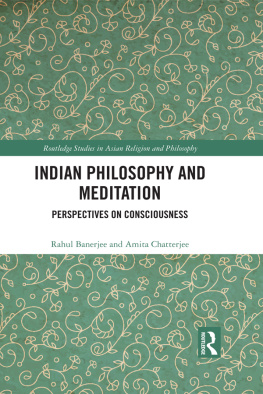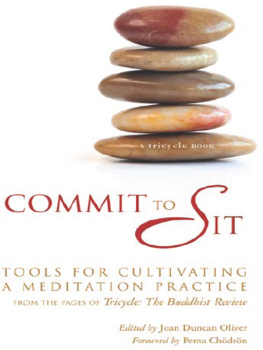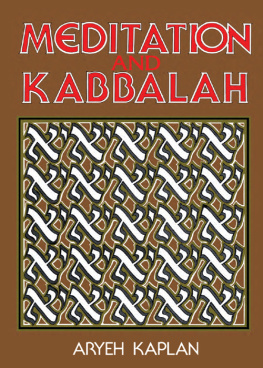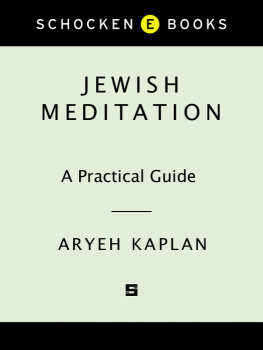THE MEDITATIVE MIND
The Varieties of Meditative Experience
by Daniel Goleman
Also by Daniel Goleman from More Than Sound
Leadership: The Power of Emotional Intelligence
The Brain and Emotional Intelligence: New Insights
Better Parents, Better Spouses, Better People with Daniel Siegel
Knowing Our Emotions, Improving Our World with Paul Ekman
Training the Brain: Cultivating Emotional Intelligence with
Richard Davidson
Good Work: Aligning Skills and Values with Howard Gardner
The Inner Compass for Ethics and Excellence with Naomi Wolf
Socially Intelligent Computing with Clay Shirky
Rethinking Education with George Lucas
Leading the Necessary Revolution with Peter Senge
Ecological Awareness: Dialogues on Ecological Intelligence
Of Interest:
Awake at the Wheel: Mindful Driving
Available at morethansound.net
Copyright
2012 by Daniel Goleman - All Rights Reserved
Digital Edition Published by More Than Sound
Florence MA

www.morethansound.net
Images by Tracy Lee
The Meditative Mind: The Varieties of Meditative Experience / Daniel Goleman
1st Digital Edition
ISBN 978-1-934441-21-3
FOREWORD
by Ram Dass
Swiftly arose and spread around me the peace and joy and knowledge that passes all the art and argument of the earth; and I know that the hand of God is the elder hand of my own, and I know that the Spirit of God is the eldest brother of my own...
- Walt Whitman Leaves of Grass
I have been in that heaven the most illumined
By light from Him, and seen things which to utter
He who returns hath neither skill nor knowledge;
For as it nears the object of its yearning
Our intellect is overwhelmed so deeply
It can never retrace the path that it followed.
But whatsoever of the holy kingdom
Was in the power of memory to treasure
Will be my theme until the song is ended.
- Dante Inferno
Most of us do not have quite such a vivid and compelling experience as did Dante or Whitman, yet you and I do have moments when we become disoriented in time and/or space; moments when we seem to be at the doorway to another state of being; moments when our own personal viewpoint seems trivial and we sense a greater intuitive harmony in the universe. Perhaps your experiences have come after becoming "lost" in a compelling film, book, piece of art or music, or church service; perhaps after a period of reverie near a brook, a mountain, or the ocean; possibly as the result of a high fever; at the moment of a traumatic event; through drugs or childbirth; from looking at the stars or falling in love. What is so provocative about these moments is that we are out of personal control, and yet all seems harmonious and all right.
In these experiences we sense, though usually cannot articulate, a more profound meaning to our lives. The sine qua non of these experiences is that they are not mediated by our intellect. Often, however, immediately after they pass, we return to our analytic minds and attempt to label what has happened. And there is where the trouble begins. Disputes about labels have led to incredible human misunderstandings, even culminating in religious wars. Once we have labeled our experiences, these labels take on power of their own through their association with profound moments and, in addition, they give our egos the security that we know what's what, that we are in control. Some labels treat the experiences as psychological apparition: "I was out of my mind," a "hallucination," a "dissociated state," "surfacing of the unconscious mind," "hysteria," "delusion." Other labels, focusing on the content, imply a mystical or spiritual event: "God came to me"; "I came into the spirit"; "I felt the Presence of Christ," or "a spirit guide"; "I understood the Tao," or "the Dharma," or "the Divine Law."
In 1961 I became involved in a labeling dispute. Having ingested psilocybin, I had the most profound experience of my life to date. The context was religio-mystical, and a spiritual label seemed appropriate. However, I was at the time a social science professor at Harvard, and thus was quite sympathetic to labels that implied that the chemical was a psychotomimetic - that is, it made you crazy. If the chemical didn't make me crazy, I suspected the labeling conflict (often within myself) would ultimately do so. Carl Jung describes the insanity of Richard Wilhelm, translator of the I Ching , to be the result of his attempt to incorporate two disparate cultures into his being simultaneously.
Outwardly, the battle revolved around the little psilocybin mushroom. The Mexican Curanderos labeled it Teonanactyl - the flesh of the Gods - useful for divinitory and mystical experiences. Humphry Osmond made the labeling a little more palatable for the Western mind by inventing the word psychedelic, meaning "mind manifesting." The psychiatric community's label of the same mushroom was "a psychotomimetic triptomine derivative," of interest only for the experimental induction of pseudoschizophrenic states. Using one labeling system, we were explorers into the mystical realms tried by Moses, Mohammed, Christ, and Buddha. According to the other, we were damn fools, driving ourselves insane.
There was an intuitive validity to the use of the spiritual metaphors. Corroboration for these interpretations came from obvious parallels between the immediate experiences with psychedelics and the mystic literature. I resolved the almost unbearable dissonance by shifting in the direction of a spiritual interpretation. For five years we attempted to find labels that would optimize the value of these experiences for mankind. The issue had significant implications for the politics of human consciousness. Using one set of metaphors, every state of mind not continuous with rational, normal, waking consciousness was to be treated as deviant - as a reflection of lack of adjustment. The other set of metaphors treated altered states of consciousness as rare and precious opportunities for humanity to delve into greater realms of its own potential awareness. As such, these experiences ought to be cultivated rather than suppressed, even if they create a threat to existing social institutions. By raising this issue we were following in the footsteps of William James who, in 1902, wrote of altered states of consciousness in Varieties of Religious Experience :
No account of the universe in its totality can be final, which leaves these other forms of consciousness quite disregarded. How to regard them is the question, for they are so discontinuous with ordinary consciousness. Yet they may determine attitudes, though they cannot furnish formulas, and open a region though they fail to give a map. At any rate, they forbid a premature closing of our accounts with reality.
We came to appreciate the sophistication and sensitivity of Eastern systems of labeling altered states of consciousness. For approximately 4000 years Eastern religions had been evolving maps and charts for the terrain of inner exploration. We could understand some of these, while others were based on cultural perspectives too alien to our own to be useful. In 1967 I went to India because of the attraction of these maps and I wanted to find a way - or perhaps a teacher - through which I could utilize the maps more effectively. I hoped then to be able to stabilize these altered states of consciousness and integrate them with normal everyday life. None of us had been able to do so with psychedelics.
In India I met Neemkaroli Baba, who was far more than I could have hoped for. He lived in the state called sahaj samadhi, in which altered states of consciousness were an integral part of his life. In his presence one had the feeling of boundless space and timelessness, as well as vast love and compassion. Maharaji, as we called him, once ingested a huge dose of psychedelics and, to my complete surprise, nothing happened. If his awareness was not limited to any place, then there was nowhere to go, for he was already here, in all its possibilities.


